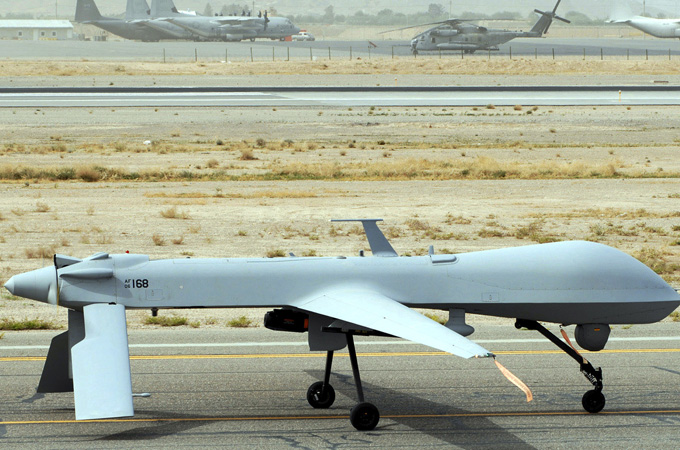Opinion by Trevor Timm – Aljazeera 7 Dec 2011
 |
| At least 50 countries already have unmanned aerial fleets - and that number is rising every month [EPA] |
An incident took place in Afghanistan where military planes had to shoot down a "runaway drone" when pilots lost control.
San Francisco, California - On Sunday, Iran claimed to have taken down a US drone in Iranian airspace - not by shooting it out the sky, but with its cyber warfare team.
Reports confirm that the US believes Iran is now in possession of "one of the more sensitive surveillance platforms in the CIA's fleet", but deny Iran's involvement. Of course, Iran’s claim of overtaking the drone with its cyber warfare team should be tempered with a serious dose of scepticism, as cyber security experts say the facts may not add up. But this is just the latest story in a series of incidents that raises worrying questions about security problems caused by drones. And given the coming proliferation of drone technology both domestically and abroad, this should be a concern to citizens all over the world.
Two years ago the Wall Street Journal reported Iran-funded militants in Iraq were able to hack into drones' live-video feeds with "$26 off-the-shelf software". In another unnerving incident, Wired reported in October that a fleet of the Air Force's drones was infected with a computer virus that captured all of drones' key strokes. Technicians continually deleted the virus to no avail. How did the drones get infected? The military is "not quite sure". Worse, the Air Force's cyber security team didn't even know about the virus until they read about it in Wired.
Wired reported in a separate story that an upcoming Congressional report will detail how hackers broke into the US satellite system. With one satellite, hackers "achieved all steps required to command" it, "but never actually exercised control".
Last summer, a drone caused a scene in the nation's capital, when, as New York Times wrote, "fighter jets were almost scrambled after a rogue Fire Scout drone, the size of a small helicopter, wandered into Washington's restricted airspace". A similar incident took place in Afghanistan where military planes had to shoot down a "runaway drone" when pilots lost control.
The US, of course, leads the world in drone use for both surveillance and combat missions. Attacks are carried out in Pakistan every four days on average. Many times, the US isn't even sure exactly who they are killing. Despite the fact that the location of vast majority of drone bases are classified, journalist Nick Turse pieced together a startling picture of the massive US fleet. He determined that the US has at least 60 drone bases operated by either the US military or the CIA around the world, and "most of these facilities have remained unnoted, uncounted, and remarkably anonymous - until now".
But drone use is not just relegated to US military. Drone manufacturers already command a $94bn market, according to some estimates, and the drone arms race is in full swing. As the Washington Post reported, the constant buzz of drones and threats of attack now dominates the lives of civilians in Gaza. And Turkey plans to have Predator drones in operation by June 2012.
Meanwhile, Chinese contractors unveiled 25 types of unmanned aircraft last year. In all, at least 50 countries now have some sort of unmanned aerial vehicles, and the New York Times reports that "the number is rising every month". That number also includes Iran, which is seeking to upgrade its fleet. Even the Libyan rebels had their own surveillance drone - provided to them by Canadian defence contractors - before they were in full control of their own country.
The technology itself is also developing at an alarmingly rapid pace. The New York Times reports that researchers in the US are working on "shrinking unmanned drones, the kind that fire missiles into Pakistan and spy on insurgents in Afghanistan, to the size of insects", along with oversized drones that can capture video of an entire city. There are birdlike drones, underwater drones, drones within drones, facial recognition drones, and perhaps most terrifying, completely autonomous drones - currently being tested in Georgia - which will require no human control at all.
As Micah Zenko, Senior Fellow at the Council on Foreign Relations, told me last month, "It's a very impressive and responsive tool that should be used sparingly. Even if we’re responsible now, we might not be forever."
But in the US, drones will become yet another way authorities can compromise the privacy of ordinary citizens, as the FAA plans to propose new rules for their domestic flight. As Newsweek reported, police forces and border patrols in the US are buying the technology from defence contractors, and one has already been spotted flying over Houston. Police departments are already using GPS and cell phone tracking without warrants, this will another powerful surveillance weapon in their arsenal. As privacy advocates warn, "drones can easily be equipped with facial recognition cameras, infrared cameras, or open Wi-Fi sniffers". And while these drones will be used for many surveillance purposes (a scary thought in and of itself), contractors admit they are equipped to carry weapons, such as Tasers.
Whether they are being used for surveillance or all-out combat, drones will soon pose serious risks for all of the world's citizens. They can offer governments, police departments, or private citizens unprecedented capabilities for spying, and given their security vulnerabilities, the potential consequences could be endless.
Trevor Timm is an activist and blogger at the Electronic Frontier Foundation. He specialises in free speech issues and government transparency.

No comments:
Post a Comment